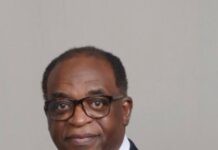 It seems like only yesterday when Alhaji Yahaya Abubakar, CFR, was sworn in as the 13th Etsu Nupe on September 11th, 2003, barely a day shy of his 51st birthday. As a birthday gift of sorts, the then colonel in the country’s armoured corps – he was promoted brigadier-general in arrears after becoming emir – couldn’t have wished for better.
It seems like only yesterday when Alhaji Yahaya Abubakar, CFR, was sworn in as the 13th Etsu Nupe on September 11th, 2003, barely a day shy of his 51st birthday. As a birthday gift of sorts, the then colonel in the country’s armoured corps – he was promoted brigadier-general in arrears after becoming emir – couldn’t have wished for better.
When his highly experienced and widely respected maternal uncle, Alhaji Umaru Sanda Ndayako, died on September 1, 2003 as the 12th Etsu Nupe, Alhaji Yahaya was not initially in serious contention as a possible successor even though it was the turn of Usman Zaki ruling house to which he belonged to produce the next Etsu.
The last time it was the house’s turn to do so in 1962 when Alhaji Muhammadu Ndayako who had ruled for 27 years, died, the rotational sequence among the emirate’s three ruling houses – Usman Zaki, Muhammadu Masaba and Umaru Majigi in that order – was disrupted when Alhaji Yahaya’s father, Nakordi Abubakar, lost the struggle for the throne to Alhaji Usman Sarki, then the country’s minister of Internal Affairs and a member of Masaba. Zaki, Masaba and Majigi were sons of Malam Dendo, the leading flag bearer of Shehu Usman bin Fodio in Nupeland during the latter’s late 19th century jihad.
Ten years ago it looked like History was going to repeat itself once more following the death of Alhaji Umaru Sanda after he’d ruled for 28 years, a year longer than his father; for a brief while it looked like the succession would be a free for all among interested candidates from all the three ruling houses. However, a piece of paper which confirmed that with Etsu Umaru Sanda the rotation among the three houses had come full circle with the houses producing four Etsus each and therefore the rotation should start all over again in the event of his death saved the day for the Usman Zaki ruling house.
Even then Alhaji Yahaya was initially not the unanimous choice of his ruling house, especially as he had spent most of his adult life as a soldier away from home. But then with the support of his uncle and titular head of the house, Alhaji Halilu Kafa, one time company secretary of the New Nigerian Development Company in its heydays, he became the nominee of the House of Usman Zaki. The Niger State governor at the time, Engineer Abdulkadir Kure, accepted the nomination without hesitation and discountenanced the candidates from the other houses.
And so on September 11, 2003 Alhaji Yahaya received his staff of office from Governor Kure as the 13th Etsu Nupe. For the man, the day must’ve been possibly the happiest in his life and the clearest manifestation of the fact that in the end God alone gives and withholds power. This seemed pretty obvious from his choice of Chapter 3, Verse 26 of the Holy Qur’an as the opening remarks of his coronation speech.
“Say: O Allah, Master of the Kingdom!” he quoted from the Qur’an in Arabic. “Though gives the kingdom to whomsoever Thou pleases and takes away the kingdom from whomsoever Thou pleases, and Thou exalts whom Thou pleases and abases whom Thou pleases; in Your hand is the good; surely Thou hast power over all things.”
The kingdom that God gave Alhaji Yahaya that beautiful Thursday morning ten years ago has had a very proud History. A measure of its historical importance lies in the position of the Etsu in the order of protocol of the emirs and chiefs in the North. According to the authoritative 2006 book, Emirs and Politicians: Reform, Reaction and Recrimination in Northern Nigeria, 1950-1966 by Professor Alhaji Mahmood Yakubu, erstwhile Executive Secretary of Tertiary Education Trust Fund (TETFUND), there were 119 gazetted emirs and chiefs in the North by the end of the First Republic in 1966.
Sixteen of these were first class, 31 second, another 31 third, seven fourth, an odd one fifth and 33 ungraded. The Etsu Nupe was the ninth among the first class emirs after the Sultan of Sokoto, the Shehu of Borno, the Emirs of Gwandu, Kano and Bauchi, the Lamido of Adamawa and the Emirs of Katsina and Zaria, in that order.
Today, the Etsu Nupe is the permanent chairman of the Niger State council of traditional rulers. And in the Gwandu western half of the historical Sokoto Caliphate, he has been second only to the Emir of Gwandu, ahead of the Emir of Ilorin and the Etsus of Agai’e, Lapai, Lafiagi, Tsonga and Tsaragi, not necessarily in that order.
Historically, the kingdom Alhaji Yahaya’s great grandfathers and grand uncles presided over first from Rabah- not the Sokoto Rabah – and finally from Bida served as an important bridge between the Sokoto Caliphate and Yorubaland and Benin Kingdom. This has led to many similarities between Nupe and Yoruba languages and cultures, itself a subject matter all of its own.
Alhaji Yahaya has good reason to celebrate his ten years on the throne of his forefathers. First, of the five Etsus from his ruling house he has ruled longest. Second, his initiation three years ago of an annual Nupe Day for the celebration of the unity, culture and the political-economy of the Nupe at home and in the Diaspora on June 26 of every year has a potential for restoring Nupeland to its old glory of being one of the most important political entities in the West African sub-region. June 26, 1896 was the day the Bida army under Makun Muhammadu defeated the Royal Niger Company Constabulary at Ogidi, in the outlaying Yoruba regions of the then vast Nupe Kingdom, when the British commenced their attempt at replacing Nupe hegemony in those areas with their own hegemony.
Bida eventually fell to the British on January 27, 1897, but not before giving the British a bloody nose for months. However, once Bida fell the collapse of the rest of the caliphate all the way to Sokoto proved more or less a piece of cake for the British.
Beyond sustaining the rich and proud legacy of his forebears, Alhaji Yahaya has served as an effective chairman of the National Mosque, Abuja, in maintaining and sustaining it as an architectural landmark and a leading centre of religious and intellectual activities in the country’s federal capital.
Ten years is just about one third the number of years his maternal uncle who he succeeded served as Etsu with distinction. In those ten years Alhaji Yahaya has achieved a lot but being only human he has also made his mistakes. Many of his subjects including this reporter, for example, believe he has been too liberal in awarding his emirate’s traditional titles to those he believes are deserving of those titles. At any rate many of these titles lack historical and cultural basis.
Again, as with so many traditional rulers in the country, those in the North in particular, there was popular anger that he became too close to the political authorities at the state and federal levels in the run-up to the 2011 elections.
Baagandozhi! May you reign for long and may your achievements surpass those of your illustrious forebears.
FEEDBACK
Sir,
Your piece, “Between Senator Anyim and Hon. Bala” last week, places me in a confusing scenario. While all you said are verifiable and may to a large extent be factual, I still do not believe that you are just waking up to the reality that the entire Nigerian project is a bitter contest for the control of resources especially among the major tribes of Nigeria. Although your bitterness cannot be said to be misplaced, it is too skewed to a section to make the desired impact. We all know that the ‘turn by turn’ syndrome which we all consciously instituted and inflicted on ourselves through zoning, federal character, power sharing etc have turned the country into a fertile ground for crass nepotism and tribalism which you are now bitter about. But the North which you feel so grossly short changed by the Secretary to the Government of the Federation has itself in recent times been unmindful of its diversity and especially the need for cohesion being a region with a multiplicity of ethnic tribes and
religion. Ask the minorities of the North and you will understand how painful it can be to be marginalized. Little wonder, some sections of the North are trying to redefine the concept of Northern Nigeria rightly or wrongly as clearly reflected in the unending ethnic and sectarian clashes. Before we can overcome issues like the ones you raised, charity must begin at home and we must accept that diversity is strength especially when we all understand what we commonly stand for and that an injustice to one is an injustice to all. While it is proper for any individual to blow the whistle when injustice is perceived, this must always be done irrespective of who is involved otherwise it will end up as a nice story badly told. As the saying goes, a truth told with a bad intent is worst than a lie. However, we must keep talking until we get to a point of common understanding.
Emmanuel – 08050813181



